- Home
- Jodi Picoult
The Jodi Picoult Collection #3 Page 5
The Jodi Picoult Collection #3 Read online
Page 5
“Itzy Fisher?” Delia accused when I sat back down. “You like her?” And then she got up and ran out of the cafeteria.
Groaning, I flopped my head down on my arms. “I didn’t make that card for Itzy. It was for Delia.”
“Delia?” Fitz said.
“You wouldn’t understand.”
Fitz stared right at me. “What makes you think that?”
In the thousands of times I have replayed this moment over the years, I realize that what happened next could have gone a different way. That had Fitz been less of a best friend, or more competitive, or even more honest with himself, my life might have turned out very different. But instead, he asked me for a dollar.
“Why?”
“Because she’s pissed at you,” he said, as I fished into my lunch money. “And I can fix that.”
He took a Sharpie from his binder and wrote something across George Washington’s face. Then he creased the bill the long way. He brought up the bottom edge and then the halves, turned it over, and tucked in both sides. A few more maneuvers and then he handed me a dollar folded into the shape of a heart.
When I found Delia, she was sitting underneath the water fountain near the gym. I handed her Fitz’s heart. I watched her open it, read the message along with her: If all I could ever have is you, I’d be a billionaire.
“Itzy might get jealous,” Delia said.
“Itzy and I broke up.”
She burst out laughing. “That’s the shortest relationship in history.”
I glanced over at her. “You’re not still mad at me, are you?”
“That depends. Did you write this?”
“Yes,” I lied.
“Can I keep the dollar?”
I blinked. “I guess.”
“Then no,” she said. “I’m not mad.”
I waited for years to see Delia spend that dollar on something—every time she pulled out money to buy candy or ice cream or a Coke, I’d scan it for Fitz’s words. But as far as I know she never spent it. As far as I know, she has it, still.
* * *
When I go into Andrew’s house, it’s quiet. I call for Delia, but there’s no answer. Wandering around, I check the bathroom and the living room and the kitchen, and then I hear noise coming from upstairs. The door to Sophie’s room is closed; when I open it she is on the floor, playing with the Crime Scene Dollhouse. Delia and I got to calling it that when Sophie would leave the rooms with the contents overturned, a Barbie or two spread-eagled on the floor of the kitchen or bathroom. “Daddy,” she says, “did you bring Grandpa home?”
“I’m working on it,” I tell her, ruffling her hair. “Where’s Mommy?”
“Out back with Greta.” Sophie holds a Ken doll up to the front door. “Open up. It’s the police,” she says.
When I look at Sophie, I see Delia. Not just in the physical features—Delia’s dark hair and rosy cheeks are duplicated in our daughter—but their expressions are identical. Like how a smile unfurls across both their faces, a sail caught in a rip of wind. And the habit they have of separating the food on their plates into similar colors. Or the way, when they look at me, I so badly want to be who they see.
I watch Sophie for another moment, thinking about what I would do if someone took her away from me, how I’d upend the earth to find her. And then I hesitate, and wonder what might make me be the one to run away with her in tow.
Downstairs, I find Delia deep in thought on the outside deck. Her legs are propped up on Greta, a lightly snoring ottoman. When she sees me she startles. “Did you—”
“I can’t get him out until the arraignment tomorrow.”
“He has to spend the night at the police station?”
I weigh the cost of admitting that, actually, her father will spend the night in the Grafton County Jail, and decide against it. “First thing in the morning, we can go to the courthouse.”
She glances up at me. “But they’ll let him go, won’t they? They’re looking for someone named Bethany Matthews. That’s not me. That was never me. And I wasn’t kidnapped. Don’t you think I’d remember something like that?”
Taking a deep breath, I ask, “Do you remember your mother dying?”
“Eric, I was practically a baby—”
“Do you remember it?”
She shakes her head.
“Your father told you your mother was dead, Delia,” I say bluntly. “And then he brought you to New Hampshire.”
Her chin comes up. “You’re lying.”
“No, Dee. He was.”
Just then Fitz bursts onto the deck. “Why aren’t you answering the phone? I’ve been trying to get in touch with you for an hour!”
“I’ve been a little busy trying to get my father out of police custody.”
“You found out,” Fitz says, his jaw dropping. “About the kidnapping.”
“How the hell do you know about it?” I ask.
Fitz sits down across from Delia. “That’s why I’ve been trying to call you. You remember how we were talking about past lives the other day? Well, I started to think about how people reinvent themselves all the time. And that maybe there was a more logical explanation to the whole lemon tree memory than the fact that you used to be a citrus farmer in eighteenth-century Tuscany. So I jumped online and Googled your name. Come on inside; I’ll show you.”
We follow Fitz to Delia’s computer, buried under topographical maps of New Hampshire and Vermont and catalogs from K-9 supply companies. Fitz starts to type, and a minute later, a screen is filled with stripes of search results. The first few links are Gazette stories about Delia and Greta, making a missing-person rescue. But Fitz clicks on a different link, and a page from the St. Louis Post-Dispatch fills the screen. “CORDELIA LYNN HOPKINS,” it reads. “Daughter of Margaret Ketcham Hopkins and the late Andrew Hopkins, was born in Maryland Heights on March 16, 1973 . . .”
“That’s my birthday,” Delia says.
“ . . . in Clarkton and died March 8, 1977, at the age of four as a result of complications from an automobile accident that also claimed the life of her father. Survivors include her mother; her grandparents, Joe and Aleda Ketcham; and a brother, Lloyd. Funeral services will be conducted at 11 AM on Saturday, at the Malden Baptist Church with Reverend Thomas Monroe officiating. Interment will follow at Memorial Park Cemetery in Malden.”
“She had the same name, the same birthday. Her father died in the same car crash. And the accident happened the same year that you showed up with your father in Wexton.”
“Type in Bethany Matthews,” I tell Fitz.
The screen glows green with a new list of articles, all from the Arizona Republic. “CHILD ABDUCTED DURING CUSTODY VISIT. MOTHER VOWS TO FIND MISSING DAUGHTER. NO NEW LEADS IN SCOTTSDALE KIDNAPPING CASE.” Fitz clicks on one link.
June 20, 1977—Investigators continue to search for clues in the disappearance of Bethany Matthews, 4, of Scottsdale, who was last seen in the company of her father, Charles Matthews, 33, during a routine custody visit. Police in Albuquerque, acting on a tip, raided a hotel room that had been paid for with Mr. Matthews’s credit card, but turned up no positive results. Meanwhile, the girl’s mother, Elise Matthews, has not given up hope that her daughter will be found and returned safely. “There is nothing in this world,” Mrs. Matthews vowed yesterday at a televised press conference, “that can keep me away from her.”
Mr. and Mrs. Matthews divorced in March, and shared custody. Matthews was last seen picking up his daughter from the home of his ex-wife at 9 AM on Saturday, where he indicated that he would return before 6 PM on Sunday. When he didn’t bring Bethany back, and Mrs. Matthews was unable to reach him via telephone, she involved the police. An initial search of Mr. Matthews’s apartment suggested that the subject had permanently vacated the premises.
Volunteers who would like to contribute time or materials to the search effort should report to the Saguaro High School gymnasium. Any tips regarding the whereabouts of Bethany Matthews or Charles Matth
ews should be directed to the Scottsdale police, at 555-3333.
Delia puts her hand over Fitz’s, where it rests on the mouse. She clicks a single word at the end of the article: photo. Twin head shots fill the computer screen—one of a little girl who looks frighteningly like Sophie; the other of a younger, grinning Andrew Hopkins.
A minute later she runs out the door and into the woods, Greta bounding off at her heels. We both know enough to let her go.
“This is all my fault,” Fitz says.
“I think Andrew might be a little more to blame.”
He shakes his head. “I didn’t know her name . . . her real name. After I saw the obituary on Cordelia Hopkins, I started thinking of who might steal an identity, and why. Delia mentioned some weird memory about a lemon tree . . . so I narrowed down my search by figuring out where they’d grow.” Fitz starts counting off on his fingers. “Florida. Southern California. Arizona. Only one of them had a well-publicized kidnapping case in 1977. I called the number in the article for the Scottsdale Police, and asked about Bethany Matthews. It took a while to find someone who knew what I was talking about—all of the officers who’d worked on the case had retired. They asked me where I was calling from.”
“And you told them?”
Fitz grimaces. “I had to say I was a journalist, didn’t I? The thing is, Eric, I never told them Delia’s new name.” He gets up from the chair and faces the window, scanning the woods as if he might be able to see her. “My guess is that someone from Scottsdale heard the words New Hampshire Gazette, did a little digging on the Internet. Andrew’s a town councilman, you know how many times his picture’s been in the paper? Not to mention Delia’s?”
“He hid in plain sight,” I murmur. It seems remarkably fast for a law enforcement agency to have connected the dots—and yet, I know that it’s an illusion. A warrant for Andrew’s arrest has been sworn out for nearly thirty years; the police just didn’t know where he was so they could serve it.
Fitz turns away, his hands in his pockets. “You have to go find her.”
“You go. You’re the one who brought in the cops.”
“I know,” Fitz admits. “But I’m not the one she wants.”
* * *
By the time the end of sixth grade rolled around, boys had mustered up the nerve to ask girls out. This meant absolutely nothing, except that the duo would sit next to each other at lunch in the cafeteria, and occasionally talk on the phone. By this criterion, Delia and I were practically married—we spent far more time together than any couple in the Wexton Middle School—that is, until Fitz officially asked Delia to go out with him.
I knew it meant nothing—rumors about who liked whom flew around like gypsy moths in August—but all the same, I spent too much time wishing that I was Fitz, holding on to Delia’s hand when we balanced on the railroad tracks or lying next to her on the damp grass when we tried to look at the solar eclipse through a pinhole in a shoebox. After a while, Fitz stopped calling me, and then Delia; and I tried to convince myself that I’d never needed either of them.
I went stag to the end-of-school dance. I was listening to the boasts of Donnie DeMaurio, a twelve-year-old who had a mustache and a pack of bootleg cigarettes, when Delia appeared, crying. “Fitz broke up with me,” she said.
I couldn’t imagine why; later he told me the truth. I’d rather have both of you, he said, in that easy way of his, than just one. But at that moment, Fitz was absent and Delia was so close that the hair on my arms was reaching toward the heat of her. “I guess I could go out with you,” I said.
“You guess you could go out with me?” she repeated. “Gee, thanks for making the sacrifice. Don’t do me any favors.”
I knew her well enough to understand that when Delia pushed you away, it was her way of making sure she didn’t get shoved first. I grabbed her arm before she could run away. “I would very much like to go out with you,” I said more carefully. “Is that better?”
“Maybe.”
“So what do we do?” I asked.
She chewed her bottom lip. “We could dance. If you want.”
I had never danced with a girl before, and even though Delia and I had grown up skinny-dipping in ponds and sleeping so close in a pitched tent that we had to share each other’s air, it felt unreasonably new. My hands skimmed over Delia’s spine to settle on her hips. She smelled like peaches, and beneath her knit dress I could feel the thin elastic of her underwear.
She talked for both of us. She talked about how, on the phone one night, Fitz had asked her out, and how she didn’t know whether to say yes or no and yes had just slipped out. She talked about how she fully intended to get back her Dwight Evans baseball card, which she had given to Fitz as a way of saying she really liked him.
When the song ended, Delia didn’t pull away. She stayed there, maybe even moved a tiny bit closer. “You want to keep talking?” I asked.
“No,” she said, smiling into my eyes. “I think I’m done.”
* * *
When I find her, she is ten feet above my head, in the scarred elbow of an oak tree. Greta sits at the bottom, whining. “Hey,” I say, pushing aside some of the smaller branches and leaves. “You okay?”
Above me, the stars are coming out, a bright-eyed audience. “What if this was all my fault?” Delia asks.
“How could it be?” I reply. “You don’t even remember it happening.”
“Maybe I do and I’ve blocked it out. Maybe my father hid that from me, too.”
I hesitate. “I’m sure he’s got an explanation for what happened.”
Delia drops down from the tree, landing like a cat beside me. “Then why didn’t he give it to me?” she says, her voice striped with scars. “He had twenty-eight years. Don’t you think that’s long enough to mention, maybe, that Delia Hopkins is a dead girl from Missouri? You know, ‘Delia, honey, can you pass the Cheerios, and did I ever tell you that when you were four I stole you away from your mother?’ ” Suddenly, Delia’s face goes white. “Eric,” she asks, “do you think I still have a mother?”
“I don’t know,” I admit. “We’ll find out once we get to Arizona.”
“Arizona?”
“After your father is arraigned on fugitive charges in New Hampshire, he’ll be extradited to Arizona. That’s where the . . . crime allegedly occurred. If it goes to trial, you’ll probably be called as a witness.”
She seems horrified by this. “What if I don’t want to be one?”
“You may not have that choice,” I admit.
She takes a step closer to me, and I fold my arms around her. “What if I wasn’t meant to grow up here . . . like this?” she says, her voice muffled against my shirt. “What if there was a different cosmic plan for Bethany Matthews?”
“What if there was a different cosmic plan for Delia Hopkins, one that got ruined because of a car crash?” I search my mind frantically for the right thing to say. I try to think of Fitz, of what he would tell me to tell her. “You could have been Bethany Matthews, Delia Hopkins, Cleopatra—it wouldn’t matter. And if you’d grown up with a thousand lemon trees in the middle of the desert, with a cactus instead of a Christmas tree and a pet armadillo . . . well, then, I would have gone to law school at Arizona State, I guess. I would have defended illegal aliens crossing the border. But we still would have wound up together, Dee. No matter what kind of life I had, you’d be at the end of it.”
She smiles, just a little. “I’m pretty sure I was never Cleopatra.”
I drop a kiss on her forehead. “Well,” I reply. “That’s a start.”
* * *
We were fifteen and drunk and in the bell tower of Baker Library at Dartmouth, watching a meteor shower that, the newscasters said, would only be this vivid once in our lifetimes, although that was hard to believe, feeling as we did that we’d live forever.
We played games to pass the time: I Spy, and Twenty Questions. Anyone who didn’t get the answer had to chug. By the time our corner of the world turn
ed to face the meteor shower, Fitz was snoring with his mouth open and Delia was having trouble zipping up her sweatshirt. “Here,” I said, and I did it for her, just as a fireball chased the moon across the sky.
Delia watched the midnight show, and I watched her. Sometimes she smiled, or laughed out loud; mostly her mouth just made a wondrous O as the night changed before her eyes. When some of the activity died down, I leaned forward until our lips touched.
She drew back immediately, stared hard at me. Then she wrapped her arms around my neck and kissed me back.
I remember that we didn’t really know what we were doing, that I felt two sizes too big for my skin, that my heart was beating so hard it moved the denim of my shirt. I remember that for one moment, I believed I was hitchhiking on one of those comets, falling so fast that I’d surely burn away before I ever hit the ground.
* * *
At nine o’clock the next morning, Delia and I take a seat close to the defense table at the Wexton District Court. It is a rotating habitat for public defenders and hired guns like myself, a new one warming the chair each time the judge calls for a new case. Arraignments are a rubber-stamp process, the prosecutor riffling through a big box of files as defendant after defendant is brought in. We watch a woman get arraigned for stealing a toaster oven from Kmart, a man brought in for violating a restraining order. A third defendant, one I recognize as a hot dog stand vendor in town, has been arrested for the felonious sexual assault of a minor.
It reminds me that there are people in this world who have done worse things than Andrew Hopkins.
“Do you know the prosecutor?” Delia whispers.
Ned Floritz was the leader of my AA meeting yesterday, but recovering alcoholics are always in the business of keeping one another’s secrets. “I’ve seen him around,” I say.
When our case is called, Andrew is brought in wearing a bright orange jumpsuit that says GRAFTON COUNTY DEPARTMENT OF CORRECTIONS on the back. His hands and legs are shackled.
Beside me, Delia gasps; her father’s incarceration is, after all, still new to her. I stand up and button my jacket, carry my briefcase down to the defense table. Andrew’s eyes roam the courtroom. “Delia!” he yells out, and she stands up.

 Small Great Things
Small Great Things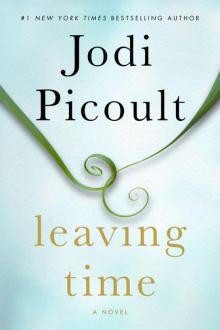 Leaving Time
Leaving Time Nineteen Minutes
Nineteen Minutes Larger Than Life
Larger Than Life Perfect Match
Perfect Match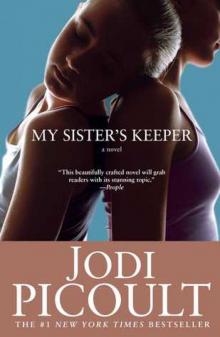 My Sister's Keeper
My Sister's Keeper The Pact
The Pact Handle With Care
Handle With Care Songs of the Humpback Whale
Songs of the Humpback Whale Mermaid
Mermaid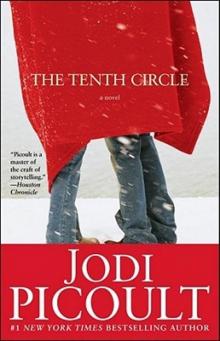 The Tenth Circle
The Tenth Circle The Color War
The Color War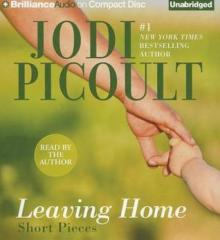 Leaving Home: Short Pieces
Leaving Home: Short Pieces House Rules
House Rules Lone Wolf
Lone Wolf The Storyteller
The Storyteller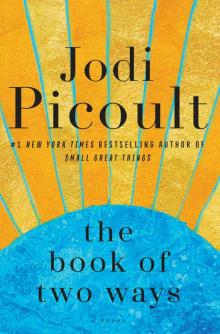 The Book of Two Ways
The Book of Two Ways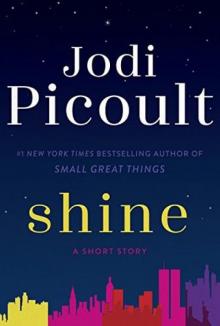 Shine
Shine Off the Page
Off the Page Sing You Home
Sing You Home Second Glance: A Novel
Second Glance: A Novel Mercy
Mercy Vanishing Acts
Vanishing Acts Between the Lines
Between the Lines Plain Truth
Plain Truth Salem Falls
Salem Falls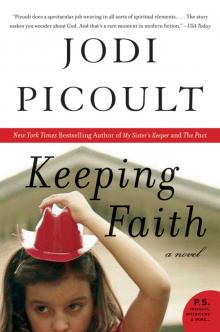 Keeping Faith
Keeping Faith Harvesting the Heart
Harvesting the Heart Change of Heart
Change of Heart Where There's Smoke
Where There's Smoke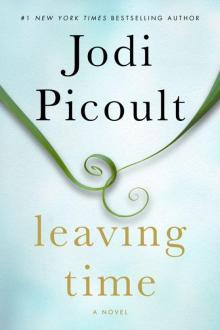 Leaving Time: A Novel
Leaving Time: A Novel Over the Moon
Over the Moon House Rules: A Novel
House Rules: A Novel The Jodi Picoult Collection #2
The Jodi Picoult Collection #2 Leaving Home: Short Pieces (Kindle Single)
Leaving Home: Short Pieces (Kindle Single) My Sister's Keeper: A Novel
My Sister's Keeper: A Novel![Mermaid [Kindle in Motion] (Kindle Single) Read online](http://i1.bookreadfree.com/i1/04/03/mermaid_kindle_in_motion_kindle_single_preview.jpg) Mermaid [Kindle in Motion] (Kindle Single)
Mermaid [Kindle in Motion] (Kindle Single) The Jodi Picoult Collection #4
The Jodi Picoult Collection #4 Sing You Home: A Novel
Sing You Home: A Novel The Jodi Picoult Collection
The Jodi Picoult Collection Lone Wolf A Novel
Lone Wolf A Novel Second Glance
Second Glance Larger Than Life (Novella)
Larger Than Life (Novella) The Jodi Picoult Collection #3
The Jodi Picoult Collection #3